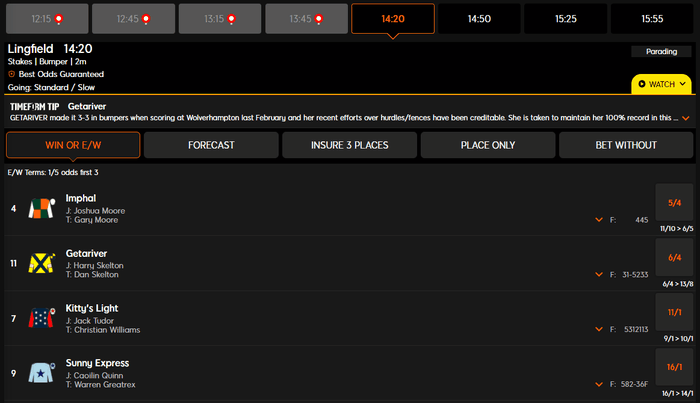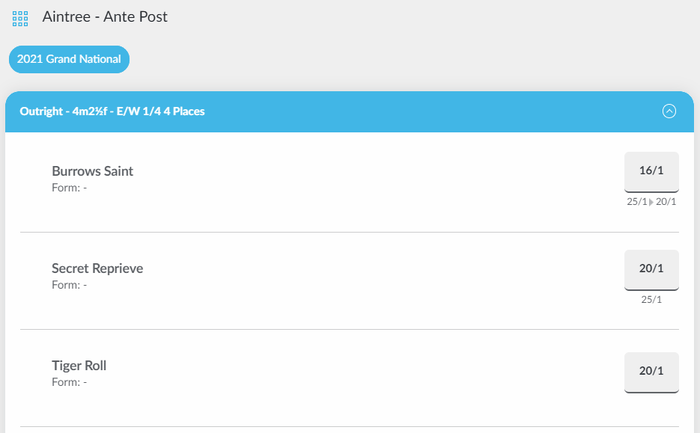 In horse racing there may be times where the horse that you have backed has been withdrawn. If this occurs then it will essentially be a non-runner in that race. Depending on where you placed the bet and what market you placed the bet with, will depend on the outcome of your bet.
In horse racing there may be times where the horse that you have backed has been withdrawn. If this occurs then it will essentially be a non-runner in that race. Depending on where you placed the bet and what market you placed the bet with, will depend on the outcome of your bet.
Most bookmakers will offer a non-runner no bet (NRNB) on markets for races taking place that day, or often from the evening before. This essentially means that if you backed that horse in a race and it gets withdrawn, you will get your stake returned to you. This is common practice for the majority of major bookmakers based around the world whether you are betting on races with early prices, betting at the SP or betting when the show prices are available close to the start of the race.
This is different to betting ante post where if you bet on a horse and it doesn’t run you will not get your money back. However, bookmakers will often make ante post markets non runner no bet early as a concession on events such as the Cheltenham Festival or the Grand National. It worth looking out for when these races have been made NRNB as it means that if your ante post selection doesn’t run, you will have your stake returned instead of losing. You can read more about ante post bets here.
When is NRNB Offered?

The non-runner no bet policy will tend to be offered on all markets that have been drawn up on the day of the race running. In this time period of time horses are likely to have either pulled out already or be registered to other races following the 48-hour declaration stage, so both you and the bookmaker will have a much better idea as to what the field of runners will look like. This is often extended to the evening before the day of the race also.
As we mentioned above, non-runner no bet is offered on certain ante post markets but when and where this is applied is at the discretion of each bookmaker so keep an eye out for when this is available.
What Races Aren’t NRNB?

You will find that for ante-post betting this sort of insurance generally wont be offered. That’s one of the catches with ante-post betting in that whatever bet you place, your horse will be treated as a runner regardless. The odds for this type of market are usually preferable when betting weeks or even months before a race, but you lose the guarantee of getting your stake back should that horse not run for whatever reason. Sometimes this will be noted somewhere on the racecard saying ‘ante post rules apply’.
Again this can change if the bookmaker is offering some sort of concession but the general rule of thumb is that ante post bets are not NRNB but races on the day of the race are.
Why is it Beneficial?
![]()
The obvious reason is that the money you have staked will get returned to you. If you don’t have this sort of insurance then a non-runner bet would mean that your bet has lost before the race has even started. It seems unfair, but there are some bookmakers that wont offer this type of bet protection in horse racing, so its worth checking to see before placing a bet, especially as the number of non-runners for each meeting is likely to be higher than you first think.
Generally speaking though, all the betting sites that you will encounter in the UK will offer money back for non-runners on bets placed on the day of the race.
Do Rule 4s Apply?

Yes, Rule 4s normally apply to bets when they are NRNB. Rule 4s are deductions made to betting winnings on a race if there is a non-runner or non-runners after you have placed your bet. This is because with less runners your selection is more likely to win, with the original odds now inaccurate. The size of the deduction depends on the odds of the non-runner, the shorter the odds, the bigger the deduction.
One of the benefits of betting ante post is that no matter which horses do not run after you placed your bet, you’re original odds and therefore returns are not altered. However, this changes when a race becomes NRNB and a Rule 4 can be applied from that point.
For more on Rule 4s, check out our dedicated article here.
